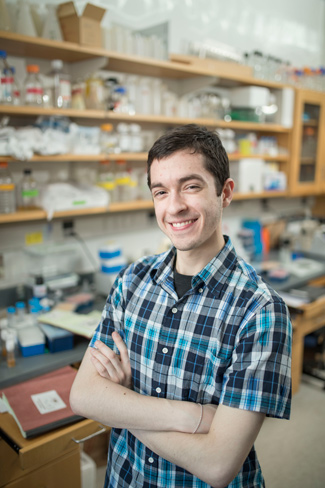
Jarrod Shilts, a senior from Boston, has been named one of 15 recipients of the Churchill Scholarship, which provides funding to pursue a master’s degree in a STEM discipline at Cambridge University in England. Shilts is pursuing degrees in molecular and cellular biology as well as neuroscience at Vanderbilt. With plans to earn a Ph.D. after his time in Cambridge, he hopes to develop and apply new genetic technologies to accelerate the discovery of basic mechanisms related to human health. Shilts is the first student from Vanderbilt to be awarded a Churchill Scholarship since 1998 and becomes the 10th overall.
Shilts will be pursuing an MPhil degree in biological sciences through a unique program in partnership between the University of Cambridge and the Wellcome Trust Sanger Institute, one of the world’s leading centers for ambitious collaborative research applying genetics to transform medicine. At Sanger, he will work to develop better ways to identify therapeutically relevant interactions between proteins.
During his extensive undergraduate research career at Vanderbilt, Shilts has worked in the laboratory of Kendal Broadie, Stevenson Professor of Neurobiology, professor of cell and developmental biology and professor of pharmacology, where he uses genetic techniques to study synaptic development. Shilts’ research discovered new neural roles for a gene whose function is related to current therapies for autism spectrum disorder and intellectual disability. The Genetics Society of America recognized his work with a Victoria Finnerty Travel Award, and he has submitted his findings as a first-authored publication.
While still a freshman, Shilts co-founded an undergraduate-run laboratory in synthetic biology that competes as part of the International Genetically Engineered Machine (iGEM) competition. Under his leadership, Vanderbilt’s iGEM lab has successfully completed multiple research projects that have been well-received at iGEM’s annual conference. Their most recent work designing safer genetic systems that are resistant to mutation received a Silver Medal from the iGEM Foundation.
Both a Littlejohn Research Fellow and a member of the SyBBURE-Searle program, Shilts has pursued additional projects spanning from bioinformatics to microfluidics to community science outreach. He is a recipient of the Marion B. and Brent S. Watts Memorial Scholarship, the Harold Stirling Vanderbilt Honor Scholarship and the Barry M. Goldwater Scholarship, and he was elected to Phi Beta Kappa as a junior.
His Churchill application was supported by Broadie, Assistant Professor of the Practice of Biomedical Engineering Christina Marasco, Associate Professor of Biological Sciences Katherine Friedman, and graduate student Mary Lynn Dear.